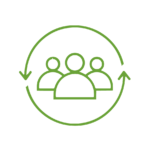September Is Suicide Awareness Month
Behavioral Health
September Is Suicide Awareness Month
September is National Suicide Prevention Awareness Month, providing an opportunity to educate people about the warning signs of suicide and how to respond to them.
According to the World Health Organization, an estimated 703,000 people a year take their life around the world. Suicide is listed as the second leading cause of death amongst individuals between the ages of 10 and 34. Suicide rates vary by race/ethnicity, age and other population characteristics, with the highest rates across the life span occurring among non-Hispanic American Indian/Alaska Native (AI/AN) and non-Hispanic White population groups.1
Suicide is a serious public health problem that can have lasting harmful effects on individuals, families and communities. Suicide along with suicide attempts cause emotional, physical and economic impacts as people who attempt to harm themselves and survive may experience injuries that can have long-term effects on their health. They may also experience depression and other mental health concerns.1
Warning Signs Common to Most Suicides
- Talking about suicide or death
- Tidying up their affairs: drawing up a will, giving away possessions
- Drastic, sometimes aggressive, changes in behavior
- Withdrawing from social interaction
- Sudden neglect in physical appearance
- Self-mutilation or doing acts of self-harm
- Sudden increase in drug or alcohol use
- Expressing feelings of hopelessness and helplessness
- Previous suicide attempts
- Family or peers who have recently attempted or died by suicide
Note: Suicidal behaviors are a psychiatric emergency. If you or a loved one starts to demonstrate these warning signs or take any of these steps, seek immediate help. In addition to the impactful resources included on the next page, you can also visit your primary care provider, local psychiatric hospital, EAP carrier or your local emergency department.
Suicidal behaviors impact the health and well-being of friends, loved ones, co-workers and the community. When people die by suicide, their surviving family and friends may experience shock, anger, guilt, symptoms of depression or anxiety and may even experience thoughts of suicide themselves.2
According to the American Psychiatric Association, employer groups are a critical partner in helping to prevent suicide. The workplace environment has an opportunity to give people a sense of purpose and community, both of which are psychological buffers to distress. Coworkers usually have more face time than neighbors or even family members and may be better able to pick up on changes in appearance, behavior or mood. Employers have internal mechanisms for disseminating information about health risks and for linking employees to mental health and well-being resources.3
Employer Actions to Help Address Suicide Prevention
- Promote Connectedness
- Reward Emotional and Mental Health Wellness
- Raise Awareness and Change the Conversation Through Social Marketing
- Strengthen Access and Delivery of Mental Health Care
- Identify Reintegration and Return-to-Work Opportunities
As there are many influences that contribute to suicide, the goal to suicide prevention is to address and reduce risk factors as well as increase behaviors that promote resilience. Most of these deaths can be prevented with good health services, education and social support.
Where to Find Help
National Suicide & Crisis Lifeline
988 (24 hour support, English/Spanish)
The Lifeline provides 24/7, free and confidential support for people in distress, prevention and crisis resources for you or your loved ones and best practices for professionals.
24/7 Crisis Hotline: National Suicide Prevention Lifeline Network
988lifeline.org
1-800-273-TALK (8255)
(Veterans: Press 1)
Crisis Text Line
Text TALK to 741-741 to text with a trained crisis counselor from the Crisis Text Line for free, 24/7.
National Alliance on Mental Illness (NAMI)
www.nami.org
1-800-950-6264
(M-F, 10 AM – 6 PM ET)
Text NAMI to 741741 for 24/7, confidential, free crisis counseling.
Veterans Crisis Line
Send a text to 838255.
SAMHSA Treatment Referral Hotline (Substance Use Disorders)
1-800-662-HELP (4357)
RAINN National Sexual Assault Hotline
1-800-656-HOPE (4673)
National Teen Dating Abuse Helpline
1-866-331-9474
The Trevor Project
1-866-488-7386
1 https://www.cdc.gov/suicide/facts/index.html
2 Centers for Disease Control and Prevention (2010 Summer). Suicide: Facts at a Glance

